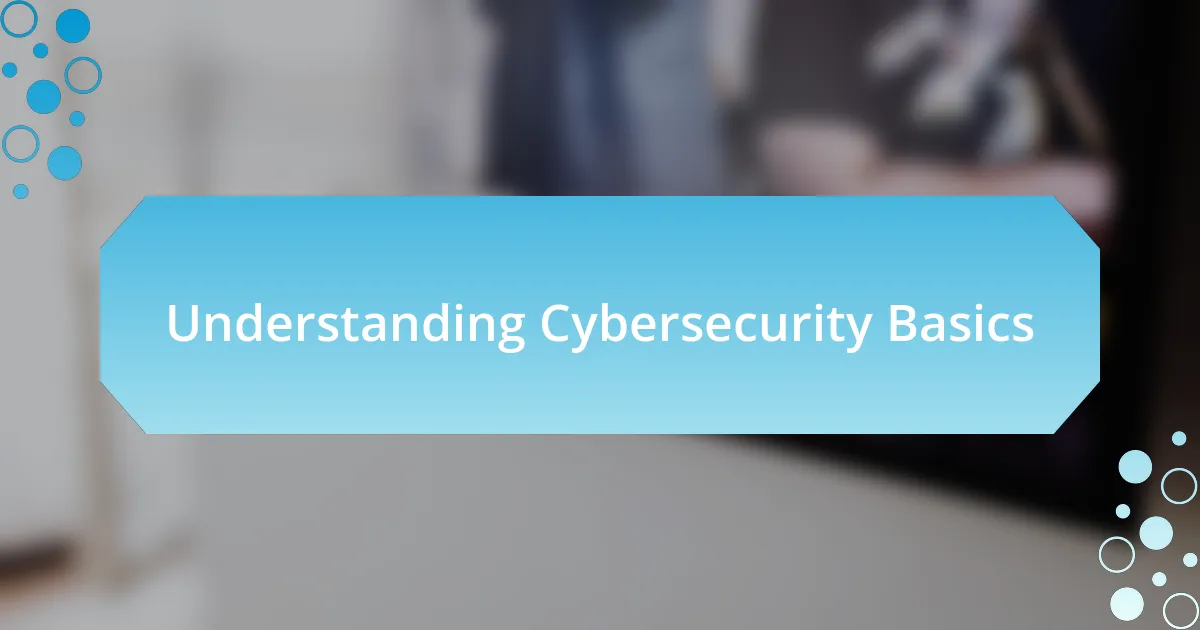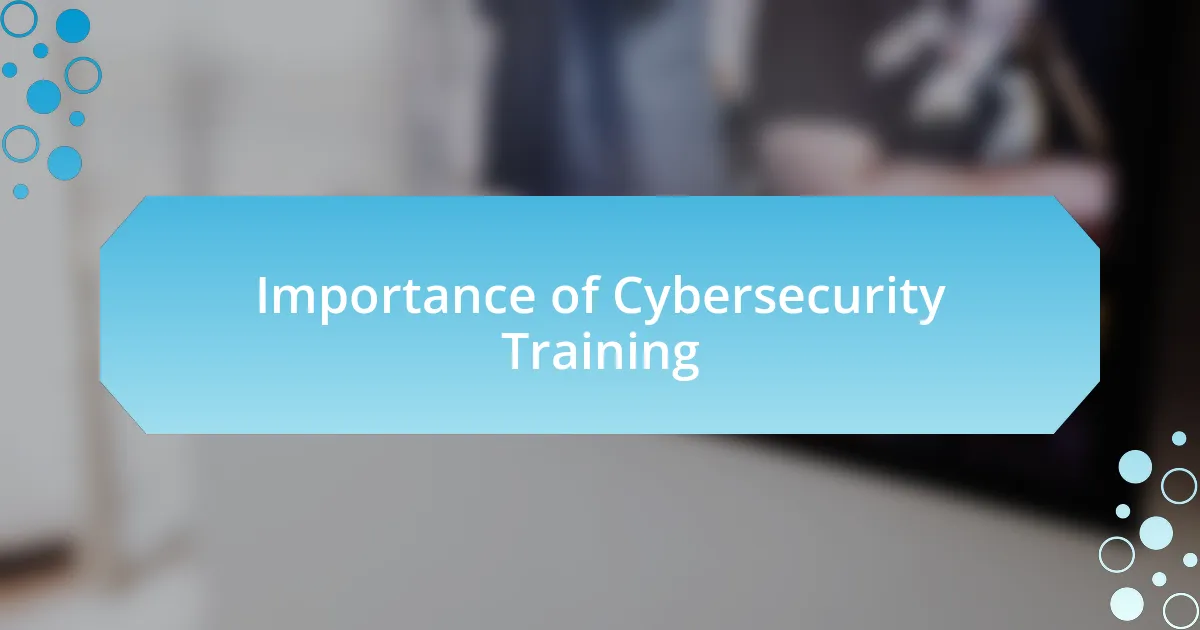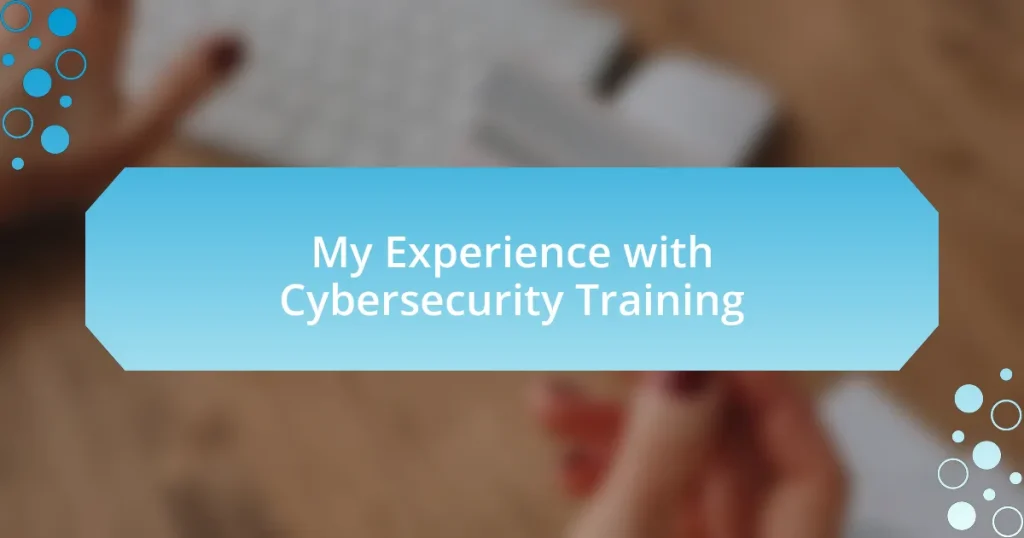Key takeaways:
- Understanding key cybersecurity concepts, such as phishing and the importance of strong passwords, enhances personal online safety.
- Effective cybersecurity training includes interactive elements, ongoing sessions, and tailored content for different roles to improve engagement and retention.
- Real-world application of training skills, such as risk assessment and incident response, demonstrates the importance of teamwork and communication in addressing cyber threats.

Understanding Cybersecurity Basics
Understanding the basics of cybersecurity is essential for anyone navigating the digital landscape. I remember the first time I learned about phishing, a tactic where attackers impersonate trustworthy entities to steal sensitive information. It was an eye-opener for me; I realized how easily I could have fallen for such a trap if I hadn’t been aware of the signs.
Some key concepts include the importance of strong passwords and the need for regular software updates. When I started implementing these strategies in my daily routine, I felt a surprising sense of empowerment. It’s incredible how small changes can significantly enhance your online security; have you ever considered how your password choices might impact your safety?
Additionally, recognizing the value of using secure networks is crucial. I vividly recall a moment when I hesitated to connect to public Wi-Fi at a coffee shop. That instinct was rooted in my training; understanding the risks made me think twice. Wouldn’t it be wise to ask yourself, how often do you connect to unknown networks without a second thought?

Importance of Cybersecurity Training
The importance of cybersecurity training cannot be overstated. I still recall a time when I received a suspicious email from what looked like a trusted source. Thanks to my training, I resisted the urge to click on the tempting link. Instead, I reported it to my IT department. That moment illustrated how training can transform a potentially dangerous situation into an opportunity for vigilance and awareness.
Here are a few reasons why cybersecurity training is crucial:
- Awareness of Risks: Training helps individuals understand the range of cyber threats, from phishing to ransomware, making them more vigilant.
- Empowerment: Knowledge equips people with the skills to protect themselves and their data, boosting confidence in their online activities.
- Proactive Defense: Well-trained employees are more likely to implement preventive measures, reducing the likelihood of a successful cyberattack.
- Crisis Response: Effective training prepares individuals to respond appropriately in case of a security breach, minimizing potential damage.

Key Components of Effective Training
Training that genuinely resonates tends to include interactive elements. I distinctly remember a workshop where we role-played various cyberattack scenarios. This hands-on approach not only made the information stick but also illuminated the consequences of our actions, creating a sense of urgency and responsibility. Effective training should invite participants to engage fully, making the lessons learned memorable and applicable.
Another critical component is ongoing training sessions. Cyber threats are constantly evolving, and I learned this the hard way during a demonstration where we examined a recent breach. The tactics used by cybercriminals had already shifted, demonstrating the need for continuous education. Consistent training ensures that everyone is up to date with the latest threats and best practices, fostering a culture of cybersecurity vigilance.
Lastly, tailoring the content to the audience can significantly enhance effectiveness. During my experience, training designed for specific roles—like IT staff versus general employees—made the information more relevant and applicable. When training resonates with the daily tasks and challenges faced by individuals, they’re more likely to take the lessons to heart.
| Key Component | Description |
|---|---|
| Interactive Learning | Hands-on activities help to ingrain lessons and simulate real-life situations. |
| Ongoing Training | Regular updates and refreshers keep employees informed of evolving cybersecurity threats. |
| Tailored Content | Customizing training for specific roles enhances relevance and engagement. |

My Personal Training Experience
During my cybersecurity training, I truly appreciated the opportunity to engage in group discussions. I vividly recall a session where we shared our individual experiences with phishing attempts. Hearing how my colleagues dealt with such threats not only expanded my perspective, but it also reinforced the reality that we are all potential targets. It was enlightening to recognize that none of us were immune; rather, we each had valuable lessons to share.
Another standout moment was when we tackled a simulated cyber crisis. Initially, I felt a surge of anxiety as the scenario unfolded, but that quickly transformed into a focus on teamwork. I found myself thinking, how would we react under real pressure? Working through the challenge with my peers helped solidify my understanding of incident response protocols, and it became clear how vital collaboration is in a crisis. It was not just about theories; it was about putting knowledge into actionable practice.
One of the most impactful parts of my training was a session dedicated to recognizing the emotional aspects of cybersecurity. We discussed the stress and fear that can come from a successful attack on our organizations. That open dialogue made me realize how important it is to support one another through those challenges. I often reflect on how every team member, regardless of their role, plays a part in creating a resilient cybersecurity culture. Don’t we all deserve to feel empowered and informed in such a critical area?

Challenges Faced During Training
As I delved deeper into the training, I encountered some pretty significant challenges. One hurdle I faced was the overwhelming amount of information to absorb. It felt like drinking from a fire hose at times! I often wondered how I could possibly retain all this knowledge. But over time, I learned to focus on key concepts and practical applications, which eased my anxiety and helped me navigate the sea of information more effectively.
Another obstacle was the emotional toll of realizing just how vulnerable we all are to cyber threats. I distinctly remember a moment when a particularly scary example of data breaches was shared. It hit me that these incidents could happen to anyone, including me. That thought was unsettling, making me realize that fear can be paralyzing. However, it also motivated me to take my training more seriously, pushing me to seek solutions rather than succumb to panic.
Additionally, collaborating with others presented its own set of challenges. While I enjoyed team exercises, I often found it difficult to coordinate effectively with individuals who had different perspectives and skills. It made me question whether we were all on the same page about our goals. Yet, those initial frustrations turned into invaluable lessons about communication and trust, teaching me that differing opinions could foster innovation and ultimately lead to more robust security strategies.

Practical Skills Gained from Training
One of the most practical skills I gained from the training was the ability to conduct a thorough risk assessment. The first time I sat down to identify vulnerabilities in a mock scenario, I was surprised by how quickly I could pinpoint potential threats. It felt empowering to take a systematic approach, and I realized how critical this skill is in real-world applications. How often do we overlook risks in our daily routines? This training taught me to look beyond the surface and recognize the subtleties that could lead to significant issues.
Another valuable skill I developed was the art of effective incident response. I remember participating in a simulated cyber attack where we had to react in real-time. The rush of adrenaline was intense! I learned how essential it is to stay calm under pressure and follow a clearly defined process. This experience reinforced my belief that preparation is key; when faced with a crisis, the ability to execute a plan is what often makes the difference between a minor setback and a major disaster.
Additionally, I honed my ability to communicate cybersecurity concepts to a non-technical audience. I can recall a moment when I was explaining a cyber threat to a group unfamiliar with the jargon. It was challenging yet rewarding to simplify complex terms and make the topic relatable. This skill not only improved my confidence but also reminded me how crucial it is to bridge the gap between technical experts and everyday users. After all, isn’t the ultimate goal of cybersecurity to ensure that everyone understands how to protect themselves?

Implementing Knowledge in Real Work
In my day-to-day work, I’ve found that applying the knowledge from my cybersecurity training can be surprisingly transformative. I remember one specific instance when I uncovered a vulnerability in our system that had gone unnoticed for months. Identifying it felt like discovering a ticking time bomb; it made my heart race but also gave me a sense of purpose knowing I could take action to protect my colleagues and our data.
Implementing risk assessment methodologies taught me to think critically about potential threats in real work environments. For example, during a recent project, I initiated a detailed evaluation of our software deployment processes. The insights we gained were enlightening, showing me the immense power of a well-structured approach to identifying weaknesses. Have you ever felt that rush of clarity when everything just clicks? I certainly did that day, and it made the risks seem manageable rather than overwhelming.
Moreover, when responding to incidents, I discovered the significance of teamwork and clear communication. I recall a moment where we faced a minor breach, and I had to collaborate with my team to address it swiftly. The shared sense of urgency among us was palpable, and it taught me that effective incident response isn’t just about individual skills; it’s about coming together and leveraging everyone’s strengths to turn a situation around. Wouldn’t you agree that when everyone plays a part, it can make all the difference in a crisis?














